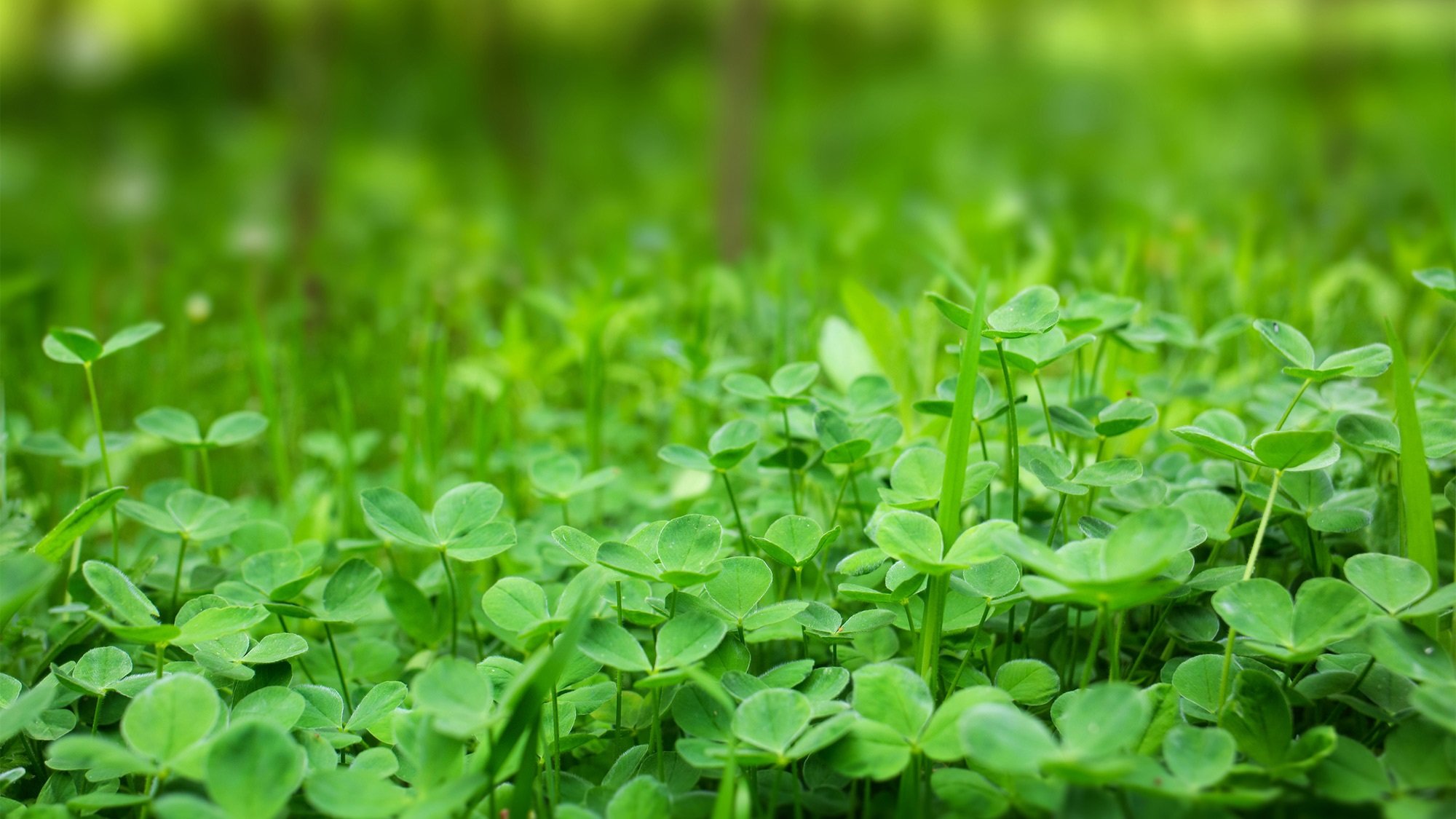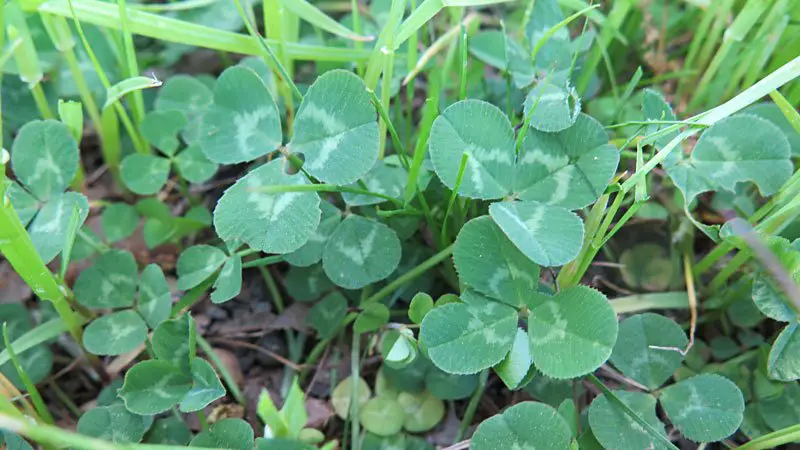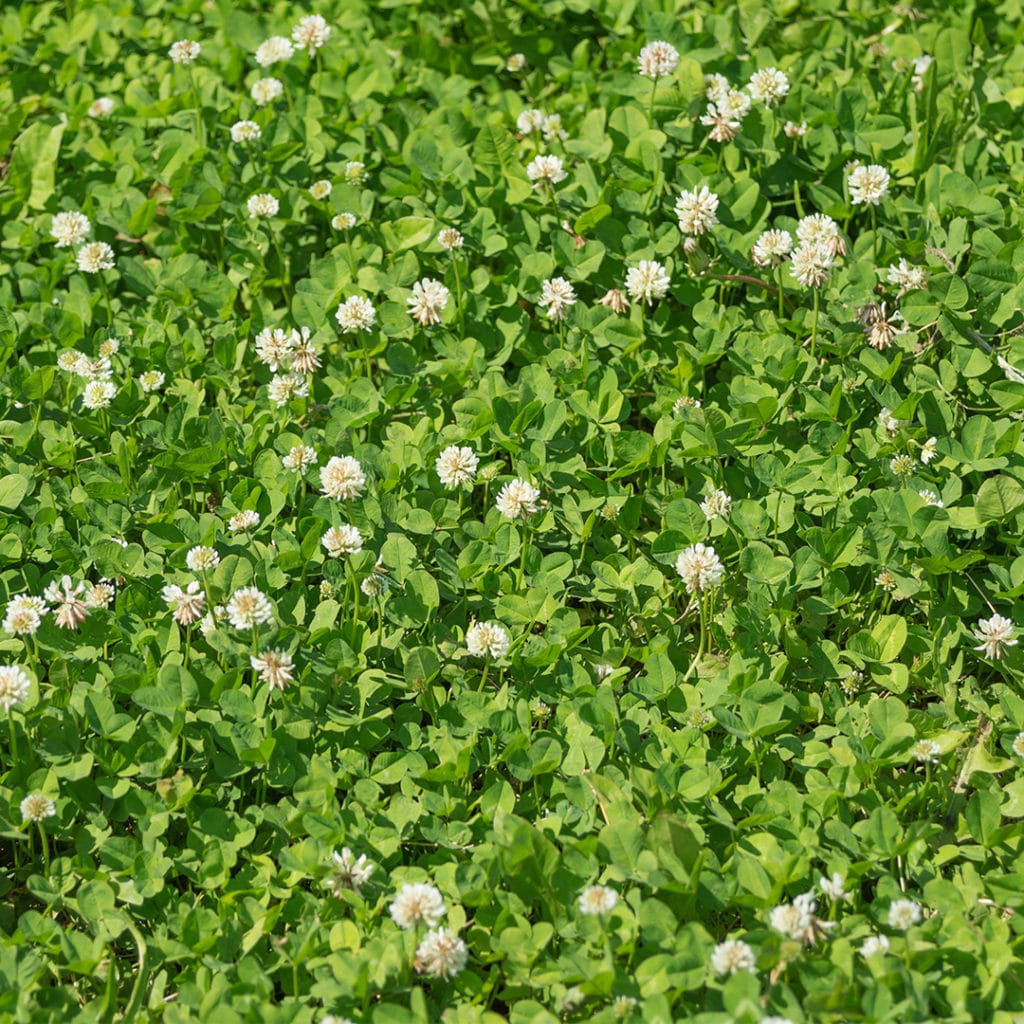Dont Mow The Grass Too Low
You will find that clover does well in grass that isnât so tall â usually shorter than 3 inches. However, your lawn grass finds this height stressful. So when the grass is too low, clover prospers while your grass struggles.
Therefore, make your grass taller than 3 inches. This way, it has a fighting chance against clover.
Are Clovers Bad For My Garden
Not really, having clovers benefits your garden. They help your lawn by adding nitrogen to the soil, which gives the surrounding flora a good boost. Also, the plant needs little to no maintenance it requires minimum fertiliser, compost, or weeding and is drought tolerant. Clovers can save your garden from other weeds by out-competing them and do well in more shady spots.
On the other hand, clovers give birth to small blossoms which can attract bees. Bees are extremely important for the environment and you should never harm them but try having a lawn covered by the insect. So, for those that are allergic to the striped bug, having a lawn covered in hundreds of tiny flowers isnt the best garden solution out there.
Also, if you are looking for a clean and uniformed green space, clovers wont do you much good in terms of aesthetics. This sort of plant can easily out crowd turf and ornamental grass, giving your lawn a weedy and unmaintained look.
Keep The Lawn In Good Health To Keep Clover Out
Keeping Clover out of our lawns, as well as most other weeds and diseases, is overwhelmingly a case of keeping the lawn as healthy as possible, including keeping up Nitrogen levels to the lawn soil.
If you havent already, begin implementing a good quality year-round organic lawn fertilising program.
This should be enough to help keep the lawn in good health and keep Nitrogen levels high enough in the soil that Clover will not take over again.
You May Like: Lawn Care Pricing Chart
Whats Causing Clover In Lawn
Some reasons make clover sprouting up in your yard. They are mostly dealing with the soil.
- The wrong soil pH will make the clover easy to grow. Then, the ideal one will have acidity between 6.0 and 7.0.
If it is higher than that, the grass will be hard to grow. However, it would be heaven for the weed. There a method to deal with it. Use soil amendments to give it the balance.
- Poor nitrogen levels are also a big problem for a lawn. The soil with this condition will make the weed thriving.
This might become the fast-acting fertilizer you have spread in the yard. It does grow the grass rapidly but the soil quality will become lower. Use the organic product instead.
- The compacted soil will make the grass out of nutrients like nitrogen, air, and water. Using a spike aerator, break up the compaction.
Why You May Want To Keep Clover In Your Lawn

You may not like the look of clover, but it can actually benefit your lawn.
- Natural Fertilizer: Clovers symbiotic relationship with beneficial bacteria allows it to absorb nitrogen from the atmosphere. Ultimately, it can make your lawn greener and more lush. However, this will keep it growing and outcompeting your grass.
- Weed Prevention: Mowing your lawn high will prevent weeds from growing, including clover. But if you like short, neat grass thats under 3 inches, letting clover flourish is a solid option. Clovers leaves cast shade over the soil, making it hard for other weeds to take root and grow and compete with your grass.
Don’t Miss: What Is The Best All Wheel Drive Lawn Mower
Reduce Oxygen And Sunlight
Depriving clover of sunlight and oxygen is a natural way to get rid of existing clover on your lawn. Cover the clover with plastic sheeting like a garbage bag, and secure the corners. It can kill clover in your lawn within a few weeks. It will, however, kill your surrounding grass at the same time as you eliminate clover.
The Soil Is Compacted
Clover tolerates compacted soil better than lawn grass and has longer roots, enabling it to access water at deeper levels that your grass can.
Core aeration, a process that loosens compacted or heavy soils, can create a better growing environment for turfgrass and help reduce the amount of clover and other weeds in the lawn.
Read Also: Plug Aerator Lowe’s
Identifying The Types Of Clovers
There are many different varieties. However, the most common which youll likely find in your yard is the white clovers. Most clovers are either annual or perennial and will grow depending on your region.
Here are the 5 most common clovers:
- White Clover Trifolium RepensWhite clovers can be found in gardens all over the world. They are incredibly adaptable and can grow in most soil conditions.
- Red Clover Trifolium PratenseRed clovers grow mostly in soil which offers an incredibly high level of calcium. They are easily established and quite environment hardy.
- Crimson Clover Trifolium IncarnatumBoasting a bold colour, the crimson clover is a winter annual, blooming big and bright. Its great for bees and other pollinators.
- Alsike Clover Trifolium HybridumAlsike clover is mostly used as a pasture plant. Due to its high nutritional value, its great for grazing livestock.
- Suckling Clover Trifolium DubiumThis variety of clover is incredibly hardy and has a unique ascending habit.
Valuable Methods To Kill Clover But Not Grass
Identifying clover is relatively straightforward. If your lawn is spotted with pink or white flowers that attract bees and butterflies, you have clover. Another easy way to determine if it is white clover marring your luscious green lawn is by their leaves. White clover features three leaves that form a petal shape.
Each of these leaves is about half an inch long, with a white crescent shape prominent on each one. White clover generally blooms in the early spring or late fall. The best time to get rid of clover is when it first begins to bloom.
Read Also: How To Kill Wild Violet Weeds In Lawn
Spray A Vinegar Solution
Create your own non-toxic weed killer with this natural home remedy.
- Mix one cup of vinegar with a cup of water and one drop of dish soap.
- Shake it up and spray it onto any patches of clover. The vinegar will dry out the clovers leaves, and the dish soap will make sure it sticks.
- You may need to spray over a series of weeks to kill off the clover completely. Unfortunately, the vinegar can damage grass, so spray the solution carefully.
You Couldnt Find A Lawn Seed Mix Without It
Other experts on the subject have similar things to say. According to Jeff Lowenfels author of influential gardening guides Teaming With Microbes and Teaming With Fungi through his 40 years as a gardening columnist for the Anchorage Daily News, clover was in fact considered so essential for lawns back in the day that it was a standard, even necessary, component in lawn seed mixes. Says Lowenfels, You couldnt find a lawn seed mix without it!
Turns out clover does some of the weeding for you, too. As a dense ground cover plant, clovers though they are also broad-leaved are exceptional at crowding out other broadleaf plants such as dandelions, violets, and other plants that commonly populate lawns.
Clover crowds out broadleaf weeds because it quickly forms clumps that spread by secondary roots, or stolons, says Sharapova. In agriculture too, clovers are common and successful cover crops according to studies like this one in 2015. When sown in between major crop plantings, they keep weeds down on farm fields for the upcoming year. This helps cut down on herbicide use and costs, too.
And though you maybe wouldnt expect them to be, clovers are kind to grasses. Even today, youll see many lawns and fields where clovers and grass coexist peacefully, side-by-side and grasses even return some favors to clovers, especially when it comes to a lush and beautiful lawn.
Don’t Miss: Where Are Cub Cadet Lawn Mowers Made
Whats Causing Clover In My Lawn
There are multiple reasons you could have clover sprouting up in your lawn, most of which have to do with your soil.
- Wrong Soil pH: The ideal soil pHhow alkaline or acidic the soil isfor most lawns is between 6.0 and 7.0. If your lawns soil is too acidic, it will be harder for grass to grow, and much easier for clover. Luckily, you can use soil amendments like lime to balance out the pH.
- Poor Nitrogen Levels: Clover thrives in soil with poor nitrogen levels. Grass needs nitrogen in the soil to grow well, while clover can obtain the nitrogen it needs from the air, effectively making its own fertilizer. Your soil may be low in nitrogen because youve used too much fast-acting fertilizer. While they promote rapid grass growth, they can ultimately lower your soil quality. Switching to organic fertilizer like manure or corn meal can help you avoid this.
- Compacted soil: Compacted soil prevents your grass from getting the nutrientsincluding nitrogenair, and water it needs. Luckily, you can break up compaction with a core or spike aerator.
Advantage #: Doesnt Mind Being Mown

While your grass will stay healthier if left longer, clover thrives whether its left long or cut short. So cutting your grass short might mean you have to mow less frequently, but the advantage goes to the clover. Grass has a more extensive root system and will push out the clover, but it needs to be healthy and strong to do that. Read more about best mowing practices here.
Recommended Reading: How To Get Rid Of Anthills On My Lawn
Kill The Clover With Natural Products
If you dont want to use any type of chemicals on your lawn or flower bed, you can use an organic weed killer.
You can find a lot of these online or at your local garden center. However, you have to keep in mind that the type of product you get has to be formulated for clovers. Not all organic weed killers work on every type of weed.
How To Establish A Clover Lawn
- Yard & Garden
Ah, the backyard lawn, that controversial patch of greenery adored by some and shunned by others. Restricted to the aristocracy before mechanical mowers made them possible for humbler folk, lawns have become the norm of boulevards and subdivisions alike. But how green are they?
On the one hand, lawns require large amounts of water to survive. They are monoculture crops that provide minimal benefits to nature. On the other hand, lawns are ground covers that can prevent the encroachment of unwanted or invasive weeds. They also generate oxygen, provide a lush carpet for childrens barefoot play, and offer a pleasant setting for active summer livingbadminton anyone?
However you feel about lawns, one thing is certain: you can make yours more sustainable by considering clover. Before chemical pesticides and synthetic fertilizers, the humble clover plant was a common resident in backyard lawns across the country. Almost everyones had some clover growing in itand some lawns were entirely made of clover. There were good reasons for this.
Not only is clover a leguminous plant, meaning that it can fix nitrogen from the air and release it slowly to the other plants in your lawn, it also stays green longer and needs less water than conventional grasses. Whether you are establishing a new lawn or maintaining an old one, there are great reasons to add clover to your mix.
Read Also: Where To Buy Revive Lawn Treatment
Prevent Oxygen And Sunlight
Clovers tend to grow and thrive in the presence of oxygen and sunlight. A natural solution to this is to prevent them from receiving this kind of oxygen and sunlight.
You can take a plastic sheet of any kind and use it to completely cover up the spots of clover in your lawn. It would be better if you do this for larger spots so that you do not end up removing any grass or plants too.
Make sure you place an object or weight onto the sheet to prevent it from opening up or flying off. Within a few weeks, this will remove the clovers from their respective spots.
Depriving Clover Of Oxygen
Another natural way to get rid of clover is to deprive it of oxygen and sunlight and not allowing it to grow. To do this, place a plastic sheet or garbage bag over the clover patch, securing the corners so it wont blow away. This should kill the weeds in a couple of weeks, but dont use this method long-term or the surrounding grass could be damaged as well. This is a good method for larger patches of clover.
This method is also helpful to get rid of other types of weeds like crabgrass that may be on your lawn. Its effective if you have the time to put into it.
Recommended Reading: How To Treat Rust Fungus On Lawn
You May Like: Wild Violet Herbicide Control
Leave Your Grass Longer
Some people really like the look and feel of shorter grass, but if you leave your lawn a bit longer, you can help to keep the clover population under control.
Since clover has a shallow root system and it is low to the ground, the taller grass can actually block the sun from getting to the clover, which ultimately stops its spread.
How To Remove Clover From Your Lawn Using Chemical
Natural weed removing remedies can take a lot of time to show results. If you are looking for a faster way to get rid of the weed, opt for a chemical-based solution. Here is what you can try:
- Ammonia Burn the clovers with ammonia. The chemical has the ability to scorch and kill the clover plant for good. Make sure to buy sulphate of ammonia made especially for lawns and apply it right after rain. If you dont favour waiting for a cloudy day, water your garden before the application with the help of a hose. Spread the chemical directly on the clover covered areas of your garden and only there. Perform the treatment once a month for best results. You can find this sort of ammonia in your local hardware store.
- Herbicides You can kill existing clovers and stop others from growing by applying herbicides. Remember to buy a herbicide that contains 4-Dichlorophenoxyacetic acid and Dicamba. Spread the product directly on top of the plants and keep it away from other plants. Do this once a month for maximum results. Keep in mind that commercial herbicides will take a couple of weeks to rid you of weeds.
See? Removing clovers isnt as hard as you probably thought. However, before undertaking the task of getting rid of the weed for good, make sure to do it in a cautious manner. Most of the methods described here can and will kill other plants surrounding the clovers if you are not careful while performing them.
Recommended Reading: Lawn Rolling Prices
Clovers Many Lawn Care Benefits
As she walks me through the list of everything clover is capable of for lawn health, the benefits are staggering. Clovers are a beneficial addition to turfgrass because they fix atmospheric nitrogen into soil fertilizer, with the aid of root nodules colonies of symbiotic bacteria, says Sharapova.
Clover also draws up and accumulates trace minerals. When clover decomposes, it makes the minerals available to the lawn grass and soil life. The grass becomes more disease resistant because of the health benefits of clover.
In effect, making friends not enemies with clover means reducing the use of fertilizers, herbicides, and any chemicals one might use to keep disease at bay. This could save people a pretty penny, and it also makes clover way better for the environment than grass-only lawns.
Sharapova adds, Including clover in a lawn can eliminate the need for synthetic fertilizer, which then reduces nutrient runoff into local streams and aquatic habitat can reduce erosion.
Its A Perennial Just Like Your Grass

Be aware that clover is a perennial. That is why you will need to take steps to get rid of it every year until your lawn is clover-free.
We all know that lawn maintenance is a constant process, and you will have to stay on top of keeping your lawn in tip-top shape.
Making sure that your lawn is well-fertilized and watered will help your grass outperform any clover thats present.
You May Like: How To Kill Wild Violet Weeds In Lawn
What Do Clovers In Our Lawns Indicate
The presence of Clover in lawns can be an indicator of low Nitrogen levels in the soil.
Clover requires soil with LOW Nitrogen levels because this plant can pull its Nitrogen requirement from the air.
Lawns love Nitrogen in the soil, and thats why its so important to feed our lawns with Nitrogen in the form of Organic Lawn Fertilisers, Standard Lawn Fertilisers, or by leaving the clippings on the lawn after mowing.
As soon as lawn soils begin to lack Nitrogen the lawn will become in poor health. And a lawn in poor health will be highly prone to other weeds, pests and diseases, and will not have the necessary strength to fight off these infestations naturally by itself.
When we remember the important basic principle of prevention being better than the cure in Organic Lawn Care, we see the importance of keeping our lawns in optimum health so they dont suffer problems which may later require chemical treatments. So, lets get our lawn back to good health, and keep it there.
